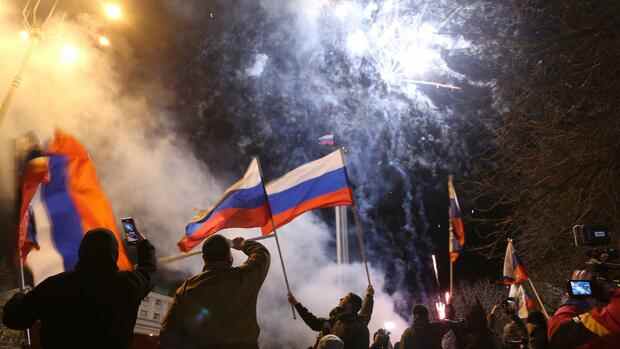People celebrate Russia’s recognition of separatist areas in eastern Ukraine.
(Photo: dpa)
Moscow Loud thunder can be heard in the middle of the night on Tuesday in the eastern Ukrainian city of Donetsk. But it’s not gunfire, the noise in the city center comes from fireworks. The Russian national anthem blares from loudspeakers while around 50 men and women wave Russian flags and cheer in front of the cameras.
The reporter from Russian television justified the rather meager participation for a former city of millions, which has been under separatist control since 2014, with the fact that there is still a night-time curfew in Donetsk. Nevertheless, it was one of the happiest days for Donbass in recent years.
Galina and Ludmila are also convinced of this. The two Moscow pensioners watched Putin’s speech on television and then toasted them together. “For eight years, people didn’t know where they belonged. Now they finally have security,” says Galina.
“Be prepared for the fact that the dollar will soon cost 100 rubles,” says entrepreneur Ilya. On Tuesday, a dollar was still available for 80 rubles. But he believes in a quick victory over the Ukrainian army. Who should beat them, asks his chess partner Igor, but adds thoughtfully: “Our boys will die for someone’s ego.” But such nuances are rather rare.
Top jobs of the day
Find the best jobs now and
be notified by email.
Polls suggest a wave of Russian solidarity with the population in the separatist areas. According to the state opinion research institute VTSIOM, 78 percent of Russians agreed with the decision to take in refugees from Donbass. Nationwide polls recognizing the sovereignty of Ukraine’s breakaway territories are yet to be carried out, but a poll in Chita, in the Russian Far East, found 60 percent of those polled supported President Vladimir Putin’s decree.
The exciting question: Does the Russian claim go as far as Mariupol?
The mood in the Russian parliament was even clearer: on Tuesday, all 400 Duma deputies present voted in favor of the “Treaty on Friendship and Mutual Aid” between Russia, the “Donetsk People’s Republic” (DPR) and the “Luhansk People’s Republic” (LPR). call themselves the separatist areas. In the Federation Council, the upper house of parliament, the result was also unanimous.
Communist leader Gennady Zyuganov not only declared his full support for recognition, but even called for an overthrow in Kiev.
The other speakers didn’t go quite that far. Nevertheless, it remained unclear within what limits Russia would recognize the two new entities. The deputy head of the foreign affairs committee, Svetlana Zhurova, said: “Within the current borders, of course. Nobody intends to go any further.”
The head of the Committee for Cooperation between Former Soviet Republics (CIS), Leonid Kalashnikov, saw things differently. Nothing was written about this in the friendship treaty, “but I think that what is meant is the statehood that was determined in the referendum, and that took place within other borders.” With this he made claims on other areas previously controlled by Kiev – at least two-thirds of Donbass – valid.
Representatives of the LVR and DVR immediately raised their claims. Both the Foreign Ministry and Kremlin spokesman Dmitry Peskov deliberately left the point open. Foreign Ministry spokeswoman Maria Zakharova said the issue would be decided “after the ratification of the friendship treaty.”
Kremlin spokesman Peskov did not give a definitive answer despite eight specific inquiries. “Within the limits in which they were proclaimed,” Russia recognizes the republics, he said simply. He did not want to specify the date of the proclamation (2014 or 2022) or whether, for example, the port city of Mariupol, which has so far been controlled by Ukraine, should belong to the new republics.
Russia wants to force the West to make further concessions
Apparently, this omission serves the further negotiation tactics of the Kremlin. The West and Ukraine are to be forced to make further concessions.
Putin threatened earlier Monday after NATO failed to respond to Russia’s demands that Moscow has the right to ensure its security. Putin added that he would not allow Ukraine to become a possible NATO deployment area. In doing so, he repeatedly hinted at possible territorial claims ranging from the entire Donbass to the entire Black Sea region of Ukraine, which Putin called “New Russia”.
More: Unmarked tanks sighted: Eyewitnesses report massive troop movements in eastern Ukraine
